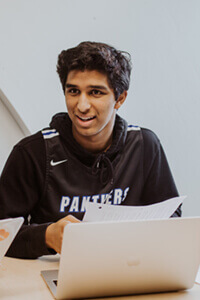August 19, 2020
 by Dhruv Muppidi, MPA senior
by Dhruv Muppidi, MPA senior
Dhruv spent his summer involved with Breakthrough Twin Cities (BTC), a local organization closely partnered with MPA. Breakthrough is a challenging academic enrichment program for highly motivated, under-resourced students, where all the teachers are high school and college students.
MPA’s close relationship with Breakthrough definitely played a large role in sparking my interest for the program. BTC’s headquarters are located on the MPA Campus, so I have had numerous encounters with the staff and faculty of the program while roaming the halls. I was first exposed to Breakthrough when my neighbor was employed by the organization, working at the BTC’s MPA offices for the entirety of my fifth-grade year. While it was terrifying to have an adult in my close vicinity who would never refrain from spilling my deepest childhood secrets to my peers, I distinctly remember–even six years later–her descriptions of how transformative the teaching fellow experience was for students in high school and undergraduates in college alike.
My privilege was something I had initially overlooked throughout middle school. In Minnesota, I remained secluded in a tiny bubble that consisted of attending school and returning home, devoid from needing to worry about the amount of food on my plate or access to hot water. I thought these things to be normal, rather than prerogatives a notable portion of the population lacked. It was not until I moved to Mexico City in the summer before eighth grade when I recognized the extent to which my conceptions regarding wealth had been misguided. Photos of the neighborhood where my family resided were often used as staple examples of the economic inequality in Mexico City, picturing colossal, technologically advanced apartment buildings right beside overcrowded streets with inhabitants lacking basic amenities. I immensely wanted to aid students who were underprivileged, and I had opportunities to, as my school’s gamma club had the primary goal of providing education for disadvantaged children in the nearby community through diverse subjects. Upon returning to the United States, this exposure is what sparked my interest in Breakthrough, observing the similarities between my neighbor’s experiences and those which I sought. In Mexico, I noticed how education is a pathway for many to escape their plight, and through Breakthrough, I would be in a position to help others do the same.
Especially in high school, I think it’s easy to get trapped in a repetitive cycle of memorizing information for a test and afterwards, promptly forgetting it as soon as possible. As a result, the usefulness of education is diminished because, in reality, nothing has been learned except how to apply this information within the confines of the classroom. At MPA, this is not the case. Learning for the sake of learning is emphasized, and consequently, the overarching significance of the content is no longer lost. For example, at my old school, my history class consisted of memorizing figures and dates in preparation for the AP exam at the end of the year. This is not necessarily a bad thing, but after the exam was over, I had no use for remembering the order of the Chinese dynasties. While being aware of famous figures, events, and dates is undoubtedly part of the MPA curriculum, it is not the focus. Rather, the importance of these events is analyzed, as seen in Ms. Murr’s history class, where my peers and I tackled issues of voter suppression, intersectional feminism, and racism in government-issued propaganda. This style of education creates highly informed, passionate students, certainly looking to “do right” in the world.
To me, teaching seemed like an impossible profession. Building strong relationships with students while simultaneously promoting mastery of certain content areas–let alone in a virtual setting–was surely too much to ask of a rising high school senior with no teaching experience other than the occasional session of tutoring. These fears dominated my initial experience, and I spent the first weeks of orientation wondering how I was possibly going to measure up to my colleagues who were undergraduates in college. I found myself mimicking the teaching styles of my peers, ultimately creating a staged, inauthentic persona. As the summer progressed, I recognized the importance of finding my own style of teaching, effectively lesson planning to suit the needs of my whole class, and pushing the limits of my comfort zone, whether that was subbing for a science class (not my forte) or singing a Justin Bieber solo in a Zoom call with forty people. Finally, I have a newfound empathy for teachers. Breakthrough is a rigorous program that simulates the teaching experience, coupling an 8-5 job with office hours, lesson planning, and department meetings all outside the work week. Most important of all, however, I understand the pain of having a teacher’s inbox. Never again will I send an email to my teaches without careful deliberation to ensure it is absolutely necessary!